LGBTQ
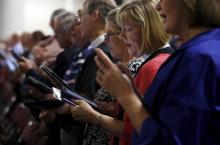
By an overwhelming majority in both of its legislative houses, the Episcopal Church made history July 1 by making marriage for same-sex couples available throughout the church.
The actions on marriage equality came after decades of progress toward fully including LGBT Episcopalians in the work and witness of the church.

When I think about that trip to Charleston with its confederate flag, slave auction block, statues to slave holders, and museums honoring the daughters of the confederacy, it makes it a whole lot harder to fully believe in the hashtag #lovewins. And when I see the subtle and not-so-subtle ways that racism has infused a largely white-led movement for LGBTQ justice — an infusion I have been complicit in even as I have attempted to critique it — my conscience convicts me. I know that in this one moment, love has won a precious victory that allows me the privilege to be healthy, loved, and fully seen. I also know that at this moment systemic racism has murdered nine beautiful people and brutalized countless others. It is a moment in time that asks us to both celebrate and mourn, and more than anything else reminds us of the work yet to be done.

“The court now holds that same-sex couples may exercise the fundamental right to marry. No longer may this liberty be denied to them.”
With these words, Justice Anthony Kennedy supported the decision of the Supreme Court to legalize same-sex marriage in the United States. Gay and lesbian couples across the country are celebrating this long-awaited decision. Those who are Christians are not only thanking the court but also thanking God. But we know that other Christians are not giving thanks — some are angry, others are confused and uncertain. Can a faithful Christian support the court’s decision? What can we say in response to questions voiced by some Christians?
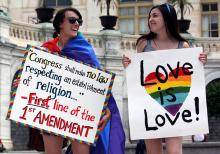
I would like to believe that Charlotte and Trudy are in the world to come, applauding and dancing.
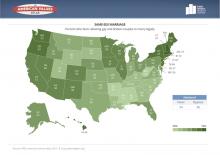
The Supreme Court ruling June 26 to legalize gay marriage rested in pragmatic legal reasoning, the same approach in the June 25 ruling on the Affordable Care Act — the decision that saved Obamacare from a “death spiral.”
Justice Anthony Kennedy, author of the majority opinion in the 5-4 decision, described equal protection under the law as an inevitable step in the evolution of changing understandings of marriage across the centuries and essential for the safety and dignity of thousands of gay and lesbian couples and their children.
The Supreme Court ruling June 26 to legalize gay marriage rested in pragmatic legal reasoning, the same approach in the June 25 ruling on the Affordable Care Act — the decision that saved Obamacare from a “ death spiral.”
Justice Anthony Kennedy, author of the majority opinion in the 5-4 decision, described equal protection under the law as an inevitable step in the evolution of changing understandings of marriage across the centuries and essential for the safety and dignity of thousands of gay and lesbian couples and their children.

In the days before the Supreme Court made it possible for gay couples to marry everywhere in the U.S., we asked two couples of faith — one Jewish who live in a state that forbids gay marriage, and one Christian and opposed to gay marriage — what the decision would mean to them.
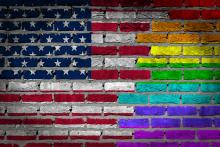
The Constitution was born within a worldview hospitable to transformation and open to corrections of injustices in letter and spirit. Examples abound: women’s right to vote, interracial marriage, the right to open legislative deliberations with prayer, and the right to education without segregation.
The Constitution has never claimed to be, in itself, the last word. Rather, it has claimed to be the first.
While I will not propose that every decision the Supreme Court has made has been for the betterment of all people, today’s ruling on same-sex marriage is an example of a nation reforming itself for the better.
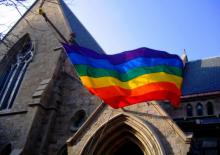
Following the Supreme Court’s ruling today that “same-sex couples may exercise the fundamental right to marry in all States,” many wondered how Christian leaders in the U.S. would react.
But despite lingering stereotypes, many religious folk in the U.S. are now supportive of same-sex marriage. In fact, a recent survey found that “among religiously affiliated Americans, supporters today actually outnumber opponents.”
Below, read some of the responses from Christian leaders — including evangelicals, Catholics, and Protestants — who have expressed their joy and support for today’s Supreme Court ruling, as well as the work left to be done towards full LGBTQ inclusion in our nation and churches.

The debate is over.
In a landmark decision, the Supreme Court decided this morning that marriage was a fundamental right for all couples regardless of gender. All Americans who wish to can now marry the same-sex partner they love. Every state law that bans such marriages is now dead. And it is over. It is finished. This debate, at long last, is done.
This is a good day to be present. I want to document this day into my memory, so I might tell my children about it later. Although at 25 I can’t possibly understand all this decision entails, there may be a day down the road when I stand tuxedoed and teary-eyed and holding the hands of another, and I want this memory to color that moment. I want to feel the gift of it.
But this day also brings up a lot of complicated feelings for me, too. I am, after all, a follower of Jesus, and many in this family of Christians are not celebrating with me. They are unsure of what to say, uncertain of what the future holds.

Gay couples have a legal right to marry, SCOTUS ruled today.
“The court now holds that same-sex couples may exercise the fundamental right to marry. No longer may this liberty be denied to them,” wrote Justice Anthony Kennedy, the Washington Post reports.
The 5-4 ruling comes as a legal confirmation of the rapidly changing tide of public sentiment towards legalizing same-sex marriage, which was legal in only four states until the last five years, but saw 33 more states rule in favor since 2010.

This is awkward.
In a June 5 Facebook post, Franklin Graham suggested that it’s time to “fight the tide of moral decay that is being crammed down our throats by big business, the media, and the gay & lesbian community. ...This is one way we as Christians can speak out — we have the power of choice. ...Let’s just stop doing business with those who promote sin and stand against Almighty God’s laws and His standards," Franklin wrote on Facebook.
But Franklin’s popular autobiography, Rebel With a Cause, was published by Thomas Nelson, a Christian publishing company. Thomas Nelson’s publicity is handled by a company called Rogers & Cowan. One of the largest public relations firms in the world, Rogers & Cowan also is the publicist for ...
... Caitlyn Jenner.
Whoops.
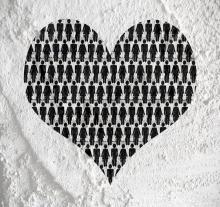
This extravagant love poured out on my behalf felt like an offer of grace from God, a reminder that though the man I had dated couldn’t love me as I should be loved, God would make up for the rest. It was a convicting moment — I have often viewed this type of love and friendship as a consolation prize for not having a significant other. What a small way to live and love when you only expect love from spouse and children and see the love of friends and family as lesser. How could such a small group of people really show all the wonder and magnitude of God’s unfailing love toward us?
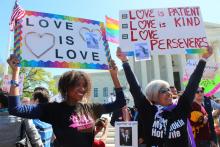
WASHINGTON — As the nine Supreme Court justices took up the vexing question of a constitutional right to same-sex marriage on Tuesday, the case came down to two competing visions of marriage: what it’s been, what it should be, and who gets to decide.
Outside the court, hundreds of demonstrators echoed both sides: Amateur evangelists and anti-gay zealots with signs proclaiming, “Man & Woman: United for Life, Open to Life,” and throngs of gay rights supporters chanting “Love Must Win!” to drown out the sidewalk preachers with their megaphones.
Yet ultimately, beyond both the arcane and real-life arguments over the state’s sanction of private relationships, the court must decide the very nature and purpose of marriage — or at least which nature will be reflected in civil law.

While reflecting upon and celebrating Easter, I did quite a bit of thinking about the controversies surrounding so-called “religious freedom” bills that have been popping up recently, most notably Indiana and Arkansas. In a recent interview on the Family Research Council radio program, “ Washington Watch with Tony Perkins," former Arkansas Governor Mike Huckabee discussed the backlash against these two pieces of legislation.
Huckabee asserted that gay-rights activists are seeking the eradication of Christian churches. According to Huckabee, “It won’t stop until there are no more churches, until there are no more people who are spreading the Gospel.”
Christianity has been and continues to be the dominant form of religious practice and expression in America. Often the rhetoric used by members of dominant groups insinuates that when people outside of their dominant group ask for equal rights and the opportunity to participate fully in American life, they are actually seeking to eradicate the existence of that dominant group.


The news of the PCUSA adopting the Marriage Amendment came to me over Twitter. Flowing down my feed were tweet after tweet of individuals applauding the latest Christian move toward inclusion (disclaimer: my feed is an echo chamber). Proud Presbyterians puffed up their chests and, hilariously, celebrated the christening of the new “Presbyqueerians” and “Lesbyterians,” and I was overwhelmed. Our church is in perpetual rehab, always growing into the person she is supposed to be and I am so proud of her latest progress. The Marriage Amendment, which affirmed the marriage of Christian same-sex couples , was not much of a surprise, given the progressive spirit of the PCUSA, but even still. It was only a week ago that the largest evangelical church in San Francisco also reformed its teaching on marriage. Three other evangelical megachurches preceded them in the last six months. And if rumors are true, more megas are coming out soon. Change is coursing through the air and knocking me over happy.
Immediately following the vote, some Southern Baptist conservatives also took to Twitter to express their harsh disapproval. Besides declaring that the PCUSA is now officially, by their definition, NOT Christian, they spoiled the often misidentified PCA (Presbyterian Church of America) with lots of love and praise for sticking to their arithmetic of “1 Man + 1 Woman = Marriage.”
I read an article by one of those enraged. He highlighted the key differences between the PCA and the PCUSA. The media had been mixing up the two, so he wrote it mostly to distinguish which one was still Christian, taking some extra digs at trending membership numbers and highlighting all the hot-button disagreements between the two. As I read it, I had to sigh a little, as I couldn’t help but hear the echoes of history reverberating beneath that piece, especially given the Presbyterian past.

On Feb. 21, Time.com broke the news that my evangelical publisher, Destiny Image, dropped a book contract it had made with me almost a year ago because its buyers refused to sell my book due to my pro-LGBTQ activism.
Many conservative evangelicals have called my pro-LGBTQ stance “deplorable” and labeled me a false teacher. Other progressives have uplifted my story as one that demonstrates the discrimination that too many conservative Christians have become known for. In all of this coverage, both positive and negative, though, the true message of my situation has gotten lost.
Sure, my publisher dropped my book contract. Sure, evangelical booksellers seem to have blacklisted me and refuse to sell my evangelical book in evangelical bookstores — a too-close-to-home example of the evangelical discrimination against the LGBTQ community and our allies.
But at the heart of this controversy, there’s a deeper problem: a fundamentally flawed belief that one cannot be a true Christian if one identifies as LGBTQ (or an ally of LGBTQ people).

Top leaders of The Church of Jesus Christ of Latter-day Saints called Jan. 27 for passage of laws granting statewide protections against housing and employment discrimination for gay and lesbian Utahns — as long as those measures safeguard religious freedom.
The move, one LGBT advocates have been pushing for years, provides a major boost for the prospects of of a state nondiscrimination statute. Such proposals have been bottled up in the legislature for years — despite the church’s historic endorsement of similar protections in Salt Lake City ordinances in 2009.
Utah’s predominant faith issued the plea for such measures at all levels of government during a rare news conference.
“We call on local, state and the federal government to serve all of their people by passing legislation that protects vital religious freedoms for individuals, families, churches, and other faith groups while also protecting the rights of our LGBT citizens in such areas as housing, employment, and public accommodation in hotels, restaurants, and transportation — protections which are not available in many parts of the country,” said church apostle Dallin H. Oaks.
My first real participation with the tension that exists between the LGBTQ community and the church came when I was a freshman at Penn State University in the spring of 1996. As is the case on many campuses, there was a preacher who would stand outside one of the campus buildings on the green and preach sermons to students. Because he stood outside the Willard Building, he was ‘affectionately’ referred to as the 'Willard preacher.' One spring day, there was a large National Coming Out Day Rally scheduled to happen on campus on the steps of the theater that sat just opposite the Willard Building. When I walked out of my calculus class that day, I had no idea that I would be walking right into the middle of a real live demonstration of the tensions that existed between LGBTQ people and the church. On one set of steps stood a group of students and speakers calling on people to be true to who they were, to not be ashamed of their sexual orientation, and to be open and proud about it. On another set of steps, led by the Willard preacher, a group of students stood chanting, “Sodomy Is Perversion!”
I did not fully understand all that was going on in my heart that day, but I felt like I had to make a choice. One choice I could make was to join the chanters. Now, growing up I had been taught that God did not affirm homosexuality, but I did not feel good about the chanting and jeers that were happening, and I didn’t think I could do that. WWJD, right? I didn’t think this was it. A second choice I could make would be to join the gay pride group. It may seem like an easy choice, but at that time and at that point in my life, I felt that joining this group was a way of saying no to God. I was struggling in my faith, but was I ready to take this step away? I could not see a way that these two groups could peaceably co-exist, and I felt like my faith in Christ was on the line. In the end, I sat down with some friends in the gay pride group.
Fast forward to this past Saturday morning. This time the choice was easier for me. The Westboro Baptist Church had gathered with their signs in protest outside the Oregon Convention Center in Portland, Ore., where the Gay Christian Network was holding their annual conference. As an act of solidarity, support, and protection, Christians from around the Portland area gathered to build a ‘wall of love’ so that conference attenders could enter with little interference from the hateful rhetoric of the Westboro Baptist group.

TOOTSIE, the 1982 Dustin Hoffman comedy in which a failing actor cross-dresses to win a part on a soap opera, is a lovely, problematic film (and just released in an excellent home edition from www.criterion.com). It’s controversial in some quarters for playing the idea of a man dressing as a woman for laughs: The joke is on any male-bodied person who challenges macho stereotypes. As when The Da Vinci Code attracted criticism for portraying a character with albinism as an insane assassin, like almost every other comparable movie has treated albinism, Tootsie represents a time when the extent of mainstream cinema’s engagement with what it thought constituted “trans” was to portray cross-dressing for laughs. But a cisgender straight character dressing up has little or nothing to do with the real stories of the “T” in LGBTQ.
Cinematic LGBTQ characters seem to evolve one step forward and a half back—beginning with their invisibility, then moving through psychopathy (the “evil queer” of Hitchcock’s Rope still shows up in The Lion King and The Avengers); martyrdom (Kiss of the Spiderwoman, Philadelphia, Brokeback Mountain); safe best friends (The Prince of Tides and My Best Friend’s Wedding); and eventually redemption (Milk, the wonderful recent Pride). The evolution continues: George Carlin’s gay best friend caricature in The Prince of Tides was in good faith, but would not pass muster today. We’re shaking off the idea that LGBTQ characters can only be suffering or sassy.